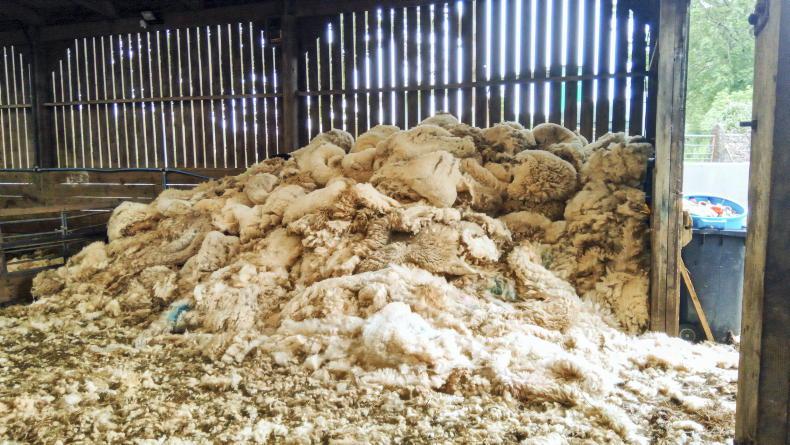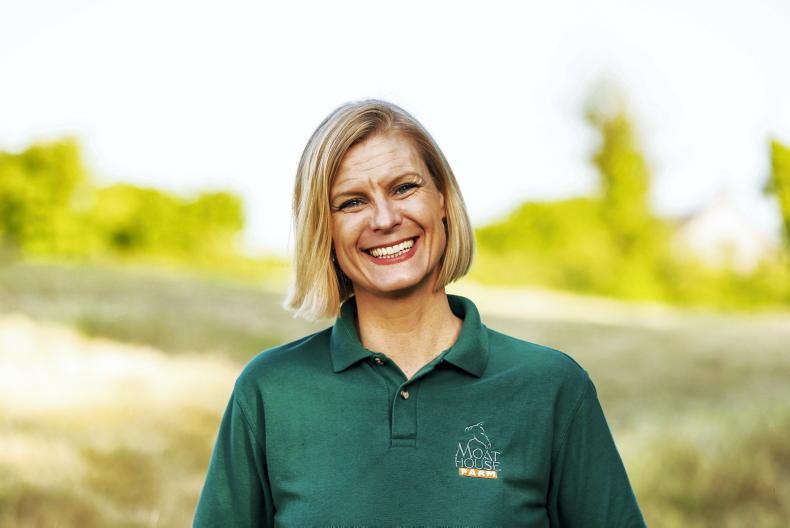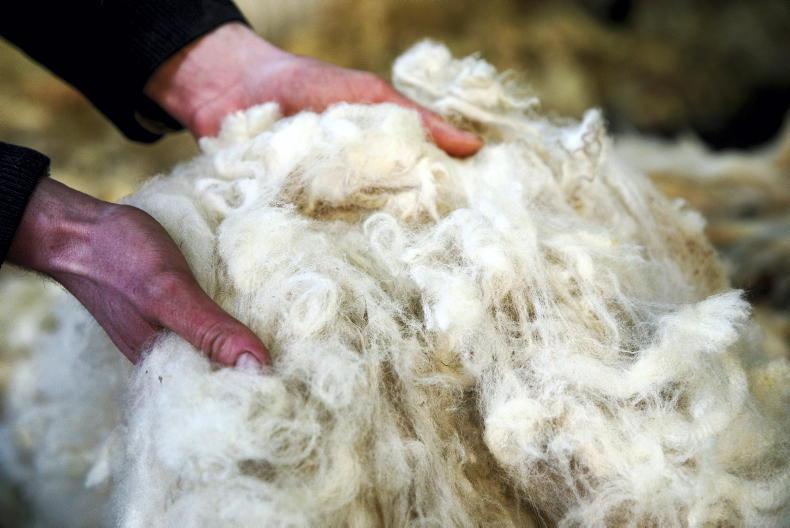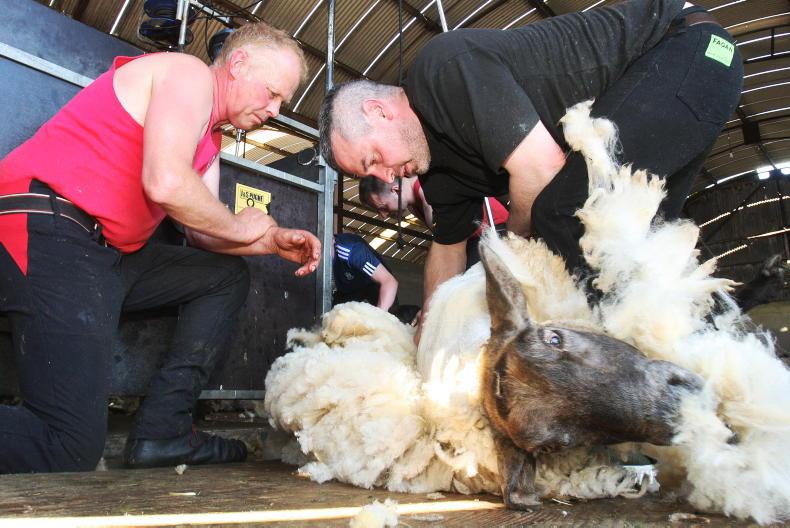A study into the feasibility of the Irish wool sector has suggested that to improve market prospects, an all-island “Irish-grown” wool brand is needed.
The brand should be developed and overseen by a Wool Council consisting of farm and wool sector stakeholders, the Wool Feasibility Study recommends.
Minister of State for Agriculture with special responsibility for land use and biodiversity, Senator Pippa Hackett, said the Department "will provide financial assistance of €30,000 towards the initial set-up costs” of such a Wool Council.
The €100,000 study was conducted by the Agile Executive following a public tender process and was published on Friday.
Wool handling
The study found that one of the main issues facing the Irish wool sector is the poor handling and presentation of wool.
Interviews conducted to inform the study confirmed that wool is being presented in a very poor state to merchants and buyers, with some reporting that as much as 10% is unsaleable due to the presence of dags.
Researchers found the poor wool presentation as “not an unexpected outcome” due to what they described as “long-term low prices that have been received by farmers where they pay over €2 to have a sheep sheared and only get paid (in some cases) 5c/kg for Scotch Mountain wool and 20c/kg for lowland wool”.

The study found that both farmers and shearers should have a role to play in improved wool handlings. \ CJ Nash
The report found that this “significant loss” is generating “farmer apathy” and a reluctance to prepare and present wool appropriately.
“This circumstance, unfortunately, plays against any hope of a buyer considering paying more for the intrinsic value of the good wool included in the bags,” the report reads.
Training
To combat this issue, the Wool Feasibility Study recommends that farmers and shearers undergo training to encourage improved wool presentation and handling.
The researchers recommend that such a training programme would be organised by farmer owned “wool co-ops” with shearers and collection agents or merchants being encouraged to sponsor wool handling training for the primary producer farmers at the start of the value chain.
The study also recommends the development of an apprenticeship in wool handling and grading, along the lines of the British Wool Board Scheme, to enable the training required in the area.
It also highlights that the certification and accreditation of shearing contractors is necessary, with an emphasis on "animal welfare standards” and shearers “taking a role in encouraging good presentation of fleeces”.
Market opportunities
Crucially, the Wool Feasibility Study analysed the potential markets for an Irish-grown wool brand and products.
While creating significant breakthrough into these markets may be challenging, the report suggests that wool’s use as a fertiliser, in insulation and as a growing medium, all have potential.
Other market opportunities, which may deliver a stronger price to primary producer sheep farmers, include wool’s use in pet bedding, pillows and duvets, carpets, home interiors, yarn and clothes and cool chain and protective packaging.

Irish wool's perceived sustainability credentials could set in apart in world markets. says the study. \ Donal O'Leary
Considering a global world market, the report noted opportunities which could set Irish wool apart from its competitors. These opportunities include the “story” of Irish wool (connected to the landscape, heritage and family farm model), wool’s traceability due to small farms, perceived sustainability and low carbon, the resilient, strong fibre of Irish wool, its health benefits and its recyclable nature.
The study provides significant detail on the specifics of these markets and is available here.
‘Valuable resource’
Minister for Agriculture Charlie McConalogue described the report launched on Friday as a “valuable resource” for the wool industry and said that he hopes it will “be used by the sector to help chart an exciting future of the wool sector”.
Minister Hackett called on stakeholders and industry "to come together to form a Wool Council that will lead the industry collaboration and innovation needed to develop and promote Irish wool domestically and internationally”.
The group who conducted the study, The Agile Executive, is made up of a consortium of experts from Munster Technological University and Donegal Yarns. The group was appointed in November 2021 to carry out the wool review.
Farmers ‘fought hard’
Irish Cattle and Sheep Farmers Association (ICSA) sheep chair Sean McNamara welcomed the publication of what he described as the “long-awaited Wool Feasibility Study”.

The ICSA says the study creates "a clear pathway towards maximising the true potential" of Irish wool.
“ICSA fought hard to make this happen on behalf of the sheep farmers we represent. Wool has been undervalued and under-utilised for far too long; now at last now we have a clear pathway towards maximising the true potential of this valuable natural resource.
“The establishment of a Wool Council and the proposed development of an Irish wool brand are hugely positives steps. The report has clearly identified the vast amount of uses for wool and it is particularly good to see the inclusion of wool-based fertiliser and insulation as key areas of potential growth,” he said.
A study into the feasibility of the Irish wool sector has suggested that to improve market prospects, an all-island “Irish-grown” wool brand is needed.
The brand should be developed and overseen by a Wool Council consisting of farm and wool sector stakeholders, the Wool Feasibility Study recommends.
Minister of State for Agriculture with special responsibility for land use and biodiversity, Senator Pippa Hackett, said the Department "will provide financial assistance of €30,000 towards the initial set-up costs” of such a Wool Council.
The €100,000 study was conducted by the Agile Executive following a public tender process and was published on Friday.
Wool handling
The study found that one of the main issues facing the Irish wool sector is the poor handling and presentation of wool.
Interviews conducted to inform the study confirmed that wool is being presented in a very poor state to merchants and buyers, with some reporting that as much as 10% is unsaleable due to the presence of dags.
Researchers found the poor wool presentation as “not an unexpected outcome” due to what they described as “long-term low prices that have been received by farmers where they pay over €2 to have a sheep sheared and only get paid (in some cases) 5c/kg for Scotch Mountain wool and 20c/kg for lowland wool”.

The study found that both farmers and shearers should have a role to play in improved wool handlings. \ CJ Nash
The report found that this “significant loss” is generating “farmer apathy” and a reluctance to prepare and present wool appropriately.
“This circumstance, unfortunately, plays against any hope of a buyer considering paying more for the intrinsic value of the good wool included in the bags,” the report reads.
Training
To combat this issue, the Wool Feasibility Study recommends that farmers and shearers undergo training to encourage improved wool presentation and handling.
The researchers recommend that such a training programme would be organised by farmer owned “wool co-ops” with shearers and collection agents or merchants being encouraged to sponsor wool handling training for the primary producer farmers at the start of the value chain.
The study also recommends the development of an apprenticeship in wool handling and grading, along the lines of the British Wool Board Scheme, to enable the training required in the area.
It also highlights that the certification and accreditation of shearing contractors is necessary, with an emphasis on "animal welfare standards” and shearers “taking a role in encouraging good presentation of fleeces”.
Market opportunities
Crucially, the Wool Feasibility Study analysed the potential markets for an Irish-grown wool brand and products.
While creating significant breakthrough into these markets may be challenging, the report suggests that wool’s use as a fertiliser, in insulation and as a growing medium, all have potential.
Other market opportunities, which may deliver a stronger price to primary producer sheep farmers, include wool’s use in pet bedding, pillows and duvets, carpets, home interiors, yarn and clothes and cool chain and protective packaging.

Irish wool's perceived sustainability credentials could set in apart in world markets. says the study. \ Donal O'Leary
Considering a global world market, the report noted opportunities which could set Irish wool apart from its competitors. These opportunities include the “story” of Irish wool (connected to the landscape, heritage and family farm model), wool’s traceability due to small farms, perceived sustainability and low carbon, the resilient, strong fibre of Irish wool, its health benefits and its recyclable nature.
The study provides significant detail on the specifics of these markets and is available here.
‘Valuable resource’
Minister for Agriculture Charlie McConalogue described the report launched on Friday as a “valuable resource” for the wool industry and said that he hopes it will “be used by the sector to help chart an exciting future of the wool sector”.
Minister Hackett called on stakeholders and industry "to come together to form a Wool Council that will lead the industry collaboration and innovation needed to develop and promote Irish wool domestically and internationally”.
The group who conducted the study, The Agile Executive, is made up of a consortium of experts from Munster Technological University and Donegal Yarns. The group was appointed in November 2021 to carry out the wool review.
Farmers ‘fought hard’
Irish Cattle and Sheep Farmers Association (ICSA) sheep chair Sean McNamara welcomed the publication of what he described as the “long-awaited Wool Feasibility Study”.

The ICSA says the study creates "a clear pathway towards maximising the true potential" of Irish wool.
“ICSA fought hard to make this happen on behalf of the sheep farmers we represent. Wool has been undervalued and under-utilised for far too long; now at last now we have a clear pathway towards maximising the true potential of this valuable natural resource.
“The establishment of a Wool Council and the proposed development of an Irish wool brand are hugely positives steps. The report has clearly identified the vast amount of uses for wool and it is particularly good to see the inclusion of wool-based fertiliser and insulation as key areas of potential growth,” he said.












SHARING OPTIONS